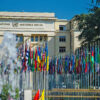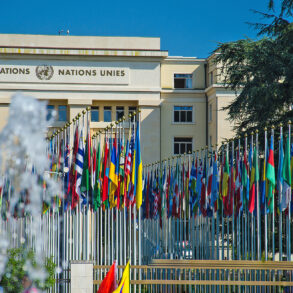Soweto (meaning South Western Townships) was established in the mid 20th century in the south of Johannesburg to house African labor. The South African Historian, Dr Paul Maylam, wrote wrote about these settlements, “Townships served as instruments for controlling urban Africans.”
Soweto made news in 1975 when school kids protested against a law that made Afrikaans, the language of the descendants of Dutch-Settlers, the primary medium of instruction in all schools. These kids confronted the State police which nothing but dance and song. It reminded one of the early Israelites who confronted the impenetrable city of Jericho by singing and marching around the city for 6 days and on the seventh day it collapsed. Those kids in ’75 were perhaps confronting a barrier of a psychological in nature. They were collapsing the illusion that the state has power, that real power belonged to them. Consequently, throughout the 80’s a staple chant amongst South African protestors was, “Amandla awethu – the power is ours.”
The above is the foundation upon which the townships were built. Even after the end of the Apartheid regime they have ballooned in size as the result of several factors like the incompetence of the governing party, population growth and the legacy of Apartheid itself. So, we sat down with Luqman Mogapi, a committee member of a Masjid in Soweto known as the Dlamini-Mosque. Judging from this interview one can safely say that the Soweto Uprising of 75 did win. The psychological walls of Jericho have collapsed now there is a chance to renewal.
Question: Thank you for talking to us, please tell us about yourself.
Thank you for talking to me. My name Luqman Mogapi. I was born in a small town called Brits, in the North West province of South Africa. I am of the Tswana clans of the Bakwena and the Bafokeng. My ancestors built their Kingdoms around the Pienaar, Moretele, Hex, Apies and the Crocodile Rivers.
Question: When did you embrace Islam and why?
I first heard about Islam at High School around 1979. We were studying a subject called Civics which one can call sociology. Then one day, mention was made of the Prophet Muhammad, sallahu alayhi wa salaam. The seeds of Islam was then planted. Even then, I intuited that Islam was a religion that stressed the importance of Justice. You should remember that this was at the height of Apartheid so that our generation’s social awareness was particularly heightened. So, everybody was searching for the truth.
During the Apartheid times, there was hardly any social intercourse between different races. It so happened, I was in town and heard the ‘Adhan for the first time. Then I knew I had to respond and become Muslim, which I did in 1981.
Question: What are false perceptions of Islam that you want to debunk?
First of all, Islam is the majority religion in the continent of Africa. The history of Islam in South Africa is interesting. For centuries the Swahili, who created a peculiar culture that had an admixture of Africans, Arabs, Persians and some Indians, were trading the coast of East Africa – from Somalia to South Africa. The word Swahili is Arabis for ‘the people of the coast’. Ibn Battuta, the famous Moroccan traveller, after his forty years traveling the world, returned home and remarked that the city of Sofala, an Island off the coast of Mozambique, was the most beautiful city in the world.
So, there was a slow propagation of Islam in the tribes at the coast of South Africa. The Zulus, for example, are found in the East coast of South Africa and if you open a Zulu dictionary and look up the word “mali” you will find that it means wealth and derives from Arabic. Other products such as beads, copper and other goods were traded with these coastal tribes for hide, ivory and gold.
That slow cultural exchange was abruptly interrupted by Vasco Da Gama and the Portuguese who butchered many peoples off the African East-Coast to establish the colony of Portugal.
Once the Cape Colony was established, it brought slaves from the Islands of Indonesia and the authorities wrote in law that the propagation of Islam among the natives was illegal. Fortunately, that law was ignored and as a result a sizable group of Khoi-San tribes and the imported slaves, who are now categorized as “Coloureds”, in Cape Town are Muslims.
In the once gold-rich City Johannesburg, Indians and the Malawi tribe of the Chewa were the Muslims in this city. But they too were told not propagate Islam amongst the indigenous tribesmen that worked in the city. Unlike Cape Town, that law was enforced by the construction of the townships for different races.
As a result, Islam in South Africa came to be known as an Indian religion. This is the major myth we have to remove. Our people are seeing Africans in South Africa embrace Islam for example the South African Minister of Foreign Affairs, Naledi Pando is a Muslim. Famously, the grandson of Nelson Mandela, Mandla Mandela, who is also a chief, is a Muslim. So the myth that Islam is an Indian religion is going away by itself.
Question: What can Islam offer South Africa?
When the Prophet Muhammad sallahu alayhi wa salaam, came to Madina, one of the first things he did was to establish a Market. Up until then commerce, trade, industry, agriculture, knowledge and learning in the city were controlled and centralised. From this act, it is very clear that the market was the most important instrument for the political and economic transformation of the society – this is what South Africa needs.
South Africa is known as the most unequal society in the world and that is the legacy of colonisation and Apartheid. Such a state of affairs is not sustainable. That is why there are occasional confrontations amongst this country’s people; because there is so much injustice and causes frustration.
I think also the setting up of libraries and public baths can also contribute a lot in the uplifting of our people. Friedrich Nietzsche says in his book The Twilight of the Idols, “The first measure taken by the Christians after the expulsion of the Moors, was the closure of the public baths, of which Cordoba alone possessed 270.”
This is what only Islam can give, because wherever Muslims went they raised people up. Philip K. Hitti, the renowned author of the History of the Arabs, writes that scientists in Cordoba with their seventeen libraries, one of which included more than four hundred thousand volumes, enjoyed luxurious baths at the time when washing the body was considered a dangerous custom at the university of Oxford. And all this was inspired by the Hadiths of the Messenger of Allah, sallahu alayhi wa salaam, that taught Muslims the importance of knowledge.
Prophet Muhammad sallahu alayhi wa salaam said, “He who desires knowledge adores Allah.” The study of a science has the value of a fast, the teaching of it, has the value of a prayer. Knowledge lights the door to paradise. Only Islam can offer this to our people.
Question: What are challenges do you want to address?
Islam is growing very fast in South Africa. This growth comes quite naturally from the youth. The other interesting development, in terms of the growth of Islam, is in the prisons, which is also the case in America. The growth comes from both the rural and urban areas. So, our challenge as a Muslim community is to help all these recent converts to the religion. How can we keep the youth from reverting and/or following modern interpretations of Islam? How can we activate them, that is, how can we harness their youthful zeal for the advancement of the Deen?
For prisoners, we also need to be true rehabilitation. In South Africa, they call prisons “Rehabilitation centres” and what they mean by rehabilitation is basically forcing the inmates to take orders just to conform. Our challenge is also to improve upon what the Nation of Islam did with its inmates and drug addicts in the 1950s. There are other movements we can learn from like the Rastafarians insistence on self-reliance. We have so much work to do.











